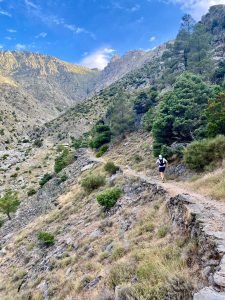Fastpacking, that hybrid creation born from the cross between trail running and survival hiking, is the mountaineering version of "travel light but suffer intensely." It's essentially about advancing multi-day routes at a hellish speed, carrying on your back everything you need to survive... and not just survive: also to keep going when your body craves rest and your mind dreams of hot showers and soft mattresses.
Those who take on this sport not only need legs trained like pistons and lungs like an alpine accordion. They must also be prepared for a mental challenge comparable to a Dostoevsky novel: long, intense, and with emotional landscapes more unpredictable than the weather in the high mountains.
Fastpacking requires running—or at least jogging with dignity—over uneven terrain, climbing slopes that feel like divine punishment, and descending slopes that would unnerve Newton himself. And all this with a backpack that doesn't weigh so much as guilt, but rather like a bad decision. Because yes: carrying your own shelter, food, first-aid kit, sleeping bag, and other small items for several days turns every gram into a small betrayal of comfort.
Strength, sweat and the science of not breaking
Preparing for this? It involves more than just training. It involves taming your body until it understands that discomfort will be its new baseline state. Walking and running long distances is just the beginning: you have to do it on the type of terrain where the Tour will take place, because training on city asphalt to run on rocky ridges is like rehearsing opera in a nightclub.
Squats, stairs, balancing on one leg: exercises that seem like part of an absurd ritual, but in the mountains they take on a mystical meaning. You also have to tame your backpack, that silent but implacable companion. At first, it seems like a mild inconvenience; by the third day, it feels like a vengeful mother-in-law whispering, "Who told you to come all this way?" every time you take a step.
The mind: that other forgotten muscle
But physicality isn't everything. The most important muscle in fastpacking—and in many human tragedies—is the brain. And we're not just talking about intelligence, but mental resilience: that mix of patience, stubbornness, and irrational faith that the worst is over.
Visualizing the route, imagining overcoming the obstacle before stumbling upon it, is a technique bordering on superstition, but it works. Practicing mindfulness may seem like an urban eccentricity, but up there, among clouds and rocks, it helps you stay sane when the path blurs, the rain intensifies, or a cramp threatens to derail your epic journey.
It's also a good idea to train with extreme challenges: impossible climbs, stifling heat, legs that ache as if they're seeking revenge. This way, you learn to negotiate with pain, to talk to it like you talk to an old enemy: without giving in, but without ignoring it.
And all this for what?
That's the big question. Why would anyone voluntarily submit to this mix of ultramarathon, hike, and medieval penance? Perhaps because in an age where everything is immediate, convenient, and predictable, walking-running-suffering for days with everything on your back is a way to recover what's essential. As if by removing the sofa, the Wi-Fi, and the microwave, one could rediscover a more primitive—and more awake—version of oneself.
Fastpacking isn't for everyone. But neither is art, poetry, or falling in love knowing it can go wrong. Only those who dare to push the limits—and carry them—find out what they're truly made of.



